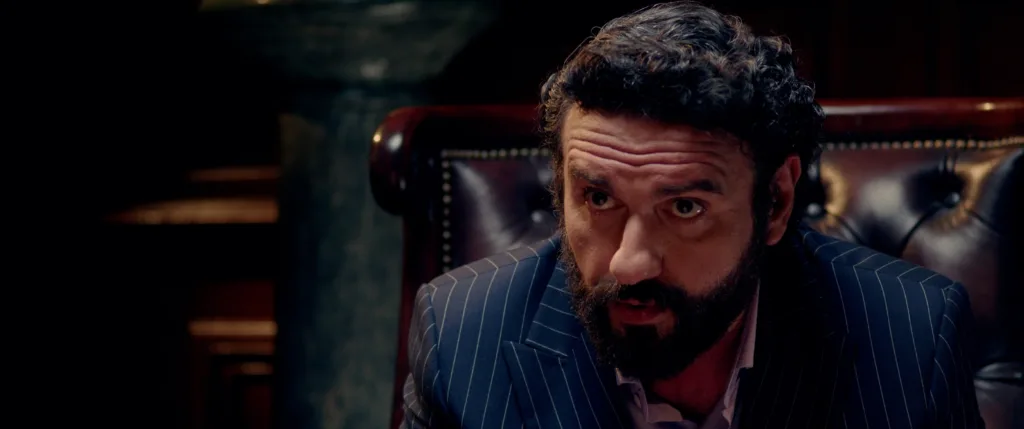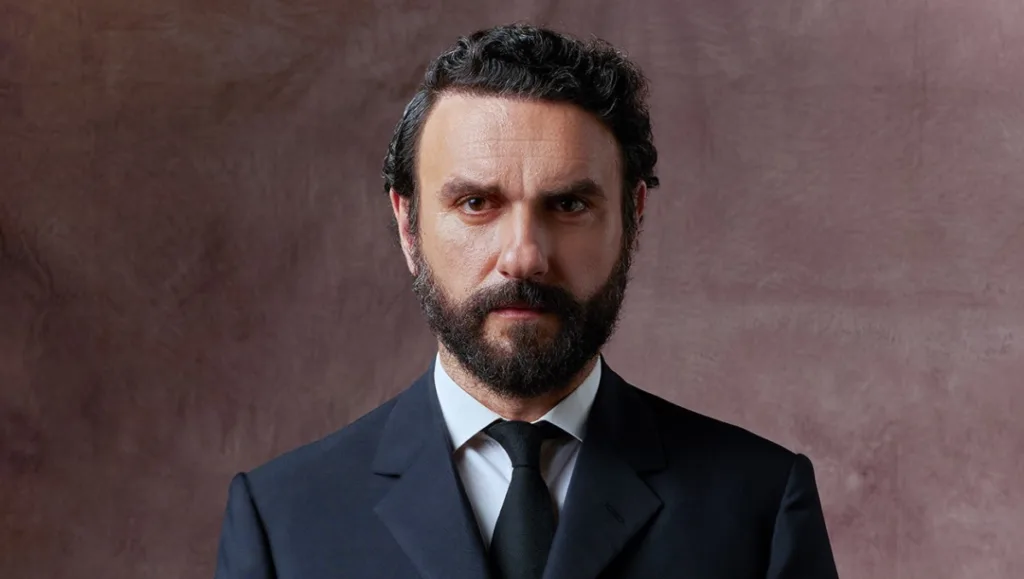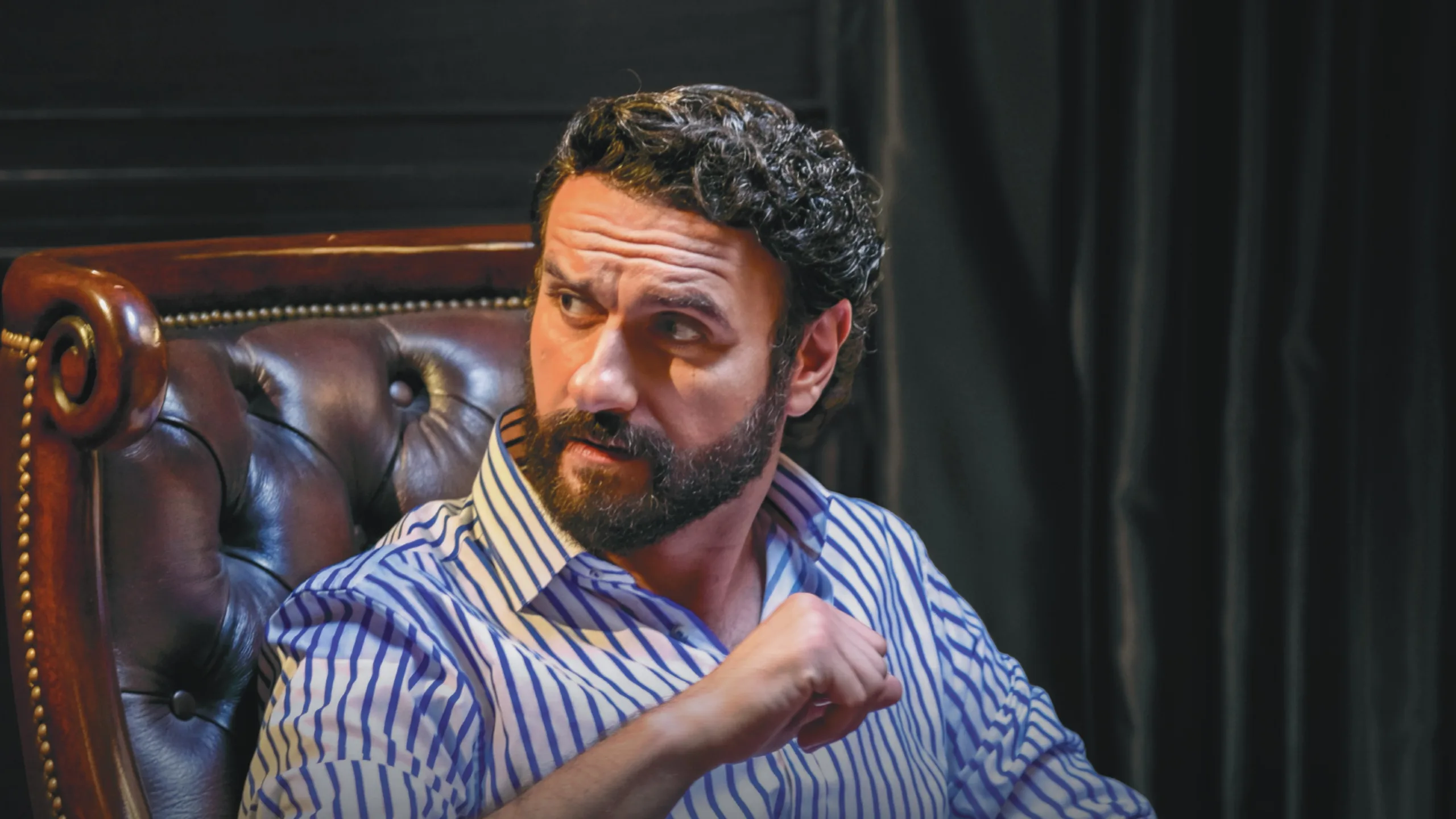By Nick Siriodis.
Actor Meletis Ilias became widely known to the Greek public in the last decade, even though he had already covered many “miles” in acting. Unlike many others, he didn’t have the passion for acting from a young age, nor did he dream of being on stage or on television as a child. That came later, after school. He doesn’t like to sugar-coat things, nor does he speak from a place of safety, even if he is considered one of the lucky ones in the industry, at least according to him.
Meletis, one of the best actors of his generation, mainly known for his roles in successful Greek TV series, theatre productions, and films, kindly granted The Greek Herald an exclusive interview just before the movie Hear Who’s Talking (Akou Poios Milaei), in which he stars, premieres at the opening night of the Greek Film Festival in Sydney in October this year.
He has worked with many acclaimed directors and actors in Greece, standing out for his talent and natural acting style. He became particularly popular through his roles in TV series such as “Your Family,” “Our Best Years,” and “Julia’s Matchmaking.” Besides TV, he has participated in numerous theatrical productions, earning praise for his performances in a variety of roles, from comedic to dramatic.
At 44, Meletis is more grounded than ever, completely down-to-earth and unaffected by the apparent glamour of his profession. After all, as he himself said, if a young person were to ask him about pursuing acting, he would advise them to think long and hard about it.
Tell us a bit about the film Hear Who’s Talking (Akou Poios Milaei) in which you star.
‘Hear Who’s Talking‘ is a film that was made with a lot of love because, essentially, the only thing we had to give was love, with me and Theodoros Nearchos, who wrote the script and directed it, and the producers of this film. So, with a lot of ignorance of the risks, without money, and without knowing the know-how, we started making a film and, I think, the fact we managed to complete it is a huge accomplishment for us.

What messages does the film convey and what feeling will it leave for viewers at the Greek Film Festival in October?
This film is a comedy that shows the life of a man whose work has consumed him so much that he has become dysfunctional in his everyday life. He can’t find a girlfriend, he has no friends, and the only thing that matters to him is work—something that is unfortunately very common nowadays, with so many people having their lives disrupted by the pace of work. Through the lens of comedy, we try to show how wrong this situation is for a person and how the voice of our conscience and reason internally urges us to live as we should.
The Greek diaspora have a special bond with their homeland and love everything Greek. Is there a message you’d like to send them?
The truth is I also have a special love for the Greeks of the diaspora because I have relatives abroad who went for a better life. My mother’s sister has been in Belgium for many years. To the Greeks of Australia, I want to send a big hug and say I hope to visit soon, as it’s one of the few places I haven’t been to, and I’ve heard so many great things. It’s definitely on my list of future travels.
Greece went through a decade-long crisis, followed by the pandemic and lockdowns. How much did it affect the film industry, and what is the current state of things?
The acting industry didn’t need a crisis or lockdown to face difficulties. We’re an industry with tremendous unemployment. Every year, 400 new actors graduate from the 20 drama schools, and only 10 of them find work. From day one, in drama school and later in our careers, we know that some months we may have work, and other months we’ll be unemployed. No actor has a full-time job; no actor has the security that other professions had before the crisis.
So what the crisis and lockdown did was make other industries become like ours. It takes a lot of luck and a lot of patience. The truth is, if a young person asked me after 20 years in the business if they should become an actor, I’d advise them to think again and look at the real picture. Sometimes we only see the result—the lights, the performances, the interviews, the theatre, and the films—but behind it all is a lot of stress and hard work.
Let’s get a bit more personal. How long have you been involved in theatre and cinema, and how did you decide to pursue this path?
I decided relatively late. I wasn’t one of those kids who were the life of the party or involved in school plays or amateur theatre groups. I finished school, enrolled in an accounting course, and at 18-19, I saw some plays and decided to get involved, always with the thought that if it didn’t work out, I’d stop. The truth is, I was consistent, as before I finished drama school, I spent about 15 years constantly working in theatre—winter and summer, morning rehearsals, and evening performances, alongside great teachers. So I was a little protected by the goddess of luck. Television came into my life after 33-34, and then cinema followed. I started to become somewhat known, and I began receiving offers for both TV and cinema. Until then, I had only done 1-2 short films.

What do you enjoy watching on television?
Due to my schedule, unfortunately, I don’t have much time to watch TV. The truth is I watch things I’ve heard about beforehand. For example, I’ve heard many people talk about ‘The Bear,’ or a while ago, I’d heard about ‘Little Deer.’ So I’m not one of the first to watch something. The one thing I do watch regularly is my favourite football team, as I’m a passionate AEK fan. I like to watch football when I can’t go to the stadium, as with performances, it’s not always easy. So I try to watch my favourite team on TV.
How have platforms like Netflix, HBO, and others changed the profession? Has it been for the better or worse?
I don’t think they’ve changed the nature of the job itself. I mean, they’ve definitely changed the outcome. It’s different for something to be intended for the big screen, aiming for box office success and ticket sales, and different for it to be released on a platform. But the nature of the job—the rehearsal process, preparation, and production to achieve the result—doesn’t change easily. It’s always the same, and when done by professionals who love what they do, the result is always respectable.
Now, with platforms, the downside for cinema is that, especially after COVID-19, cinemas haven’t had the ticket sales they used to. People have become comfortable in their armchairs and sofas at home, which isn’t great. Cinema is a beautiful experience in itself, and we shouldn’t forget that. On the other hand, platforms provided good company during the lockdown, and without Netflix, HBO, and all these platforms, I think we would have had an even harder time.
What else can we expect from you in the near and distant future?
At the moment, I’m filming the second season of the series ‘The Witch’ on ANT1. For the first time, the second season takes place 100 years before the first, so it’s essentially a prequel with a completely different cast since none of the original characters existed back then. They are, in fact, the ancestors. It’s a fantastic experience because we’re looking at a series set in the 1700s, something that hasn’t been done before in Greek television. I think the furthest back we’ve gone was the Revolution of 1821. So, this brings us a lot of joy because everything is new and different.
We have a fantastic writing duo, Petros Kalkovalis and Melina Tsambani, who wrote ‘Wild Bees’ and ‘The Witch 1,’ among many other successes. And, of course, there’s Lefteris Charitos in directing, who is a revelation for me, working with him for the first time.
I’ll also start rehearsals for the play ‘Lapland,’ a brilliant work by a Spanish writing duo, which will premiere in Thessaloniki around the holidays, just before Christmas. I’ll finally be co-starring again after five years with Vaso Laskaraki, who I worked with on ‘Your Family,’ as well as Spyros Tsekouras and Vivian Kontomari, who are friends and beloved actors of mine.
Don’t miss out on the opening night screening of ‘Hear Who’s Talking‘ at Palace Cinema Norton St on Tuesday 15th October 2024 at 8:30pm! Tickets are available now at greekfilmfestival.com.au.
Event Details
- WHAT: Hear Who’s Talking – Opening Night Film of the 29th Greek Film Festival of Sydney
- WHEN: Tuesday 15th October 2024, 8:30 pm
- WHERE: Palace Cinema Norton Street, 99 Norton Street, Leichhardt, NSW 2040
- TICKETS: https://shorturl.at/lCE04
- For more information, please visit: https://greekfilmfestival.com.au
